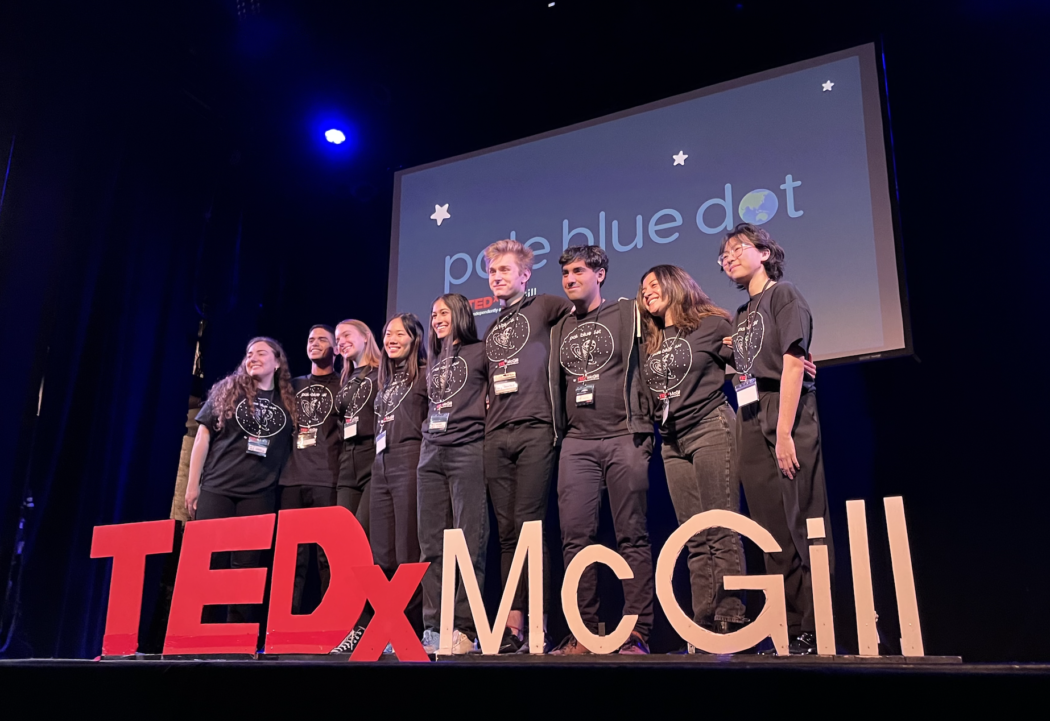On Sunday, January 22, more than 350 members of the McGill University community gathered at the Corona Theatre in Little Burgundy to attend TEDxMcGill’s first event of 2023: Pale Blue Dot. Independently organized by TEDxMcGill’s executive team, the event provided a platform for 11 different speakers and three musicians associated with McGill University to discuss various topics ranging from personal stories to breakthrough research, each performance unified by the overarching theme of a Pale Blue Dot. Inspired by Carl Sagan’s eminent book – Pale Blue Dot, which entails a photo of earth taken from 6.4 billion kilometers away – the theme of the event was chosen to elucidate underrepresented social issues and innovative research in several fields of study. While the theme can be interpreted in a variety of different ways, it was ultimately selected to demonstrate that “there is light in all of us that just needs a little nudge to shine through,” as written in the event pamphlet.
Session 1
Karim Atassi, an award-winning medical student and speaker exploring the healing properties of words in resolving conflict between people, began the first of three speaking sessions. In addition to his work establishing the Arab Student Association (ASN), which promotes harmony and understanding between Muslims, Christians, and Jews at McGill University, Karim has served on the Consultation Committee of the Canadian Federation of Medical Students to resolve disagreements on policies regarding housing and homelessness. He also represents Canada in the G20 Young Entrepreneurs’ Alliance, where he advises governments on policies that generate peace and sustainability through entrepreneurship. Karim leveraged such experiences in his speech, “Can Innovation be the Answer to World Peace?” to discuss how innovation, technology and economic integration can foster peace between both nations and people.
Then, Ruoqi Wang spoke about the intertwining relationship between architectural design, cultural exchange, and social phenomena. An advocate for multiple-perspective thinking, Ruoqi is also the director of Rewrite Your Narrative, an observer at the UN Biodiversity Conference (COP15) and is currently pursuing an architectural degree at McGill University. Having developed a global mindset through academic experiences in numerous countries, Ruoqi has a profound interest in global affairs and leadership. She drew on such experiences to share the benefits of bridging cultures and disciplines with the public in her powerful speech, “Blurring Boundaries: An Architectural Narrative of Embracing Uncertainty.”
Immediately thereafter, Anna-Maria Tosco, a psychologist and tenured psychology lecturer of over 15 years, drew on her personal experiences to speak about the manifestation of codependency. This psychological concept that refers to people who feel extreme amounts of dependency on certain people in their lives, and feel responsible for the feelings and actions of loved ones. Anna-Maria has two graduate degrees in psychology and has worked in a variety of Canadian provinces in healthcare institutions and community organizations in academic settings. Her approachable discussion, “Confessions of a Former Popular Girl, Turned Psychologist: A Tale About Codependency,” was aligned with her personal mandate to make psychological concepts more mainstream in order to decrease stigma and encourage help-seeking.
To round out the first session of speakers, Jason Dellatolla, a researcher and developer of educational video games designed for people with depression, shared his personal experiences of what it can feel like to live with depression in order to help people battling depression understand that they are not alone. As someone who has navigated depression for more than ten years, Jason is acutely aware of the wide range of onerous, shackling, and compounding symptoms of depression. As such, in his speech, “Leveling Up Through Depression,” Jason drew on both personal and professional experiences to shed light on the ways in which he and others are repurposing video games to provide players battling depression with a safe, digital environment in which they can learn and practice depression-management skills, which he hopes will improve the lives of those contending with the leading cause of disability.
Session 2
After a short break, Farzad Milani and Mahshad Nadalian resumed the event with a musical performance in which they applied re-tuning and articulation techniques on the accordion and oboe to demonstrate the distinct feeling of melodies outside the scope of classical western music and the twelve-tone system. The original piece is a “Tasnif” – one of several forms of Persian music that is similar to a ballad – written by Aref Qazvini, an Iranian poet and musician, at the beginning of Iran’s constitutional revolution to commemorate the first victims of freedom. Farzad and Mahshad arranged it specifically for the accordion and oboe to recognize the brave women who continue to fight against religious tyranny in Iran today.
Immediately after the performance, Ben Harrison came on, a Cambridge-educated physicist turned generalist who holds 16 patents – with another 50 pending. He discussed Human Light Interaction (HLI), an emerging field of research that seeks to better understand human interactions with light to develop novel technologies that better serve those needs. Drawing on his research and work experience with Korrus – an innovative company exploring the emerging field of HLI – Ben described the ways in which human-light interaction dictates humans’ circadian rhythms, and thus human health, before illuminating emerging technologies that utilize spectral agility to deliver consistent white light for vision while manipulating its underlying composition to support circadian health and improve people’s lives.
Andrei Adam, a third-year undergraduate student studying Economics and Finance at McGill University, shed light on a challenge countless organizations have faced since the COVID-19 pandemic: retaining young employees. As the Co-President of Canada’s largest Gen-Z consulting firm, JED Consulting, Andrei was able to leverage the latest JED research to provide a new perspective regarding how corporations in Canada engage with the burgeoning 16-24-year-old demographic. His speech, “Retaining Gen Z Talent: An Insider’s Perspective,” provided numerous actionable insights that organizations might adopt to employ and retain young talent in today’s increasingly competitive landscape.
Following Andrei’s speech, Evelisa Genova, the National Director of Diversity, Equity, and Inclusion (DEI) for Scouts Canada, discussed the ways in which companies and leaders can utilize storytelling to assist their inclusion journey. Leveraging more than ten years of experience working in DEI as a strategist – particularly her experience with Scouts Canada, where she developed a DEI strategy that impacted more than 40,000 members – she discussed the persistent resistance to DEI initiatives in Canada. Her discussion was intended to inspire the audience to consider new methods to navigate the complex and critical DEI work currently underway. Evelisa hopes her speech will empower people to live freely and joyously, regardless of their unique background, ethnicity, race, gender, gender identity, sexual orientation, age, or socioeconomic status.
Immediately after Evelisa’s discussion, Nancy Dewar, a Certified Executive Leadership Coach who has held several senior-level positions leading corporate coaching and learning initiatives around the world, drew upon her experience and education to help listeners relearn how to trust their instincts. Additionally, Nancy is the author of two books and a specialist in leadership development, cultural transformation, change management, as well as motivation and mindfulness. She combined insights from academic research and personal experience in her speech, “How to Relearn To Trust Your Instincts,” to illuminate the inherent advantages of instinct, and to suggest ways for people to leverage their inner instincts in their day-to-day lives.
Session 3
To begin the third session, Joseph Boonen, a third-year student at McGill University’s Desautels Faculty of Management, sang three songs while playing the guitar. Drawing his musical inspiration primarily from French folklore but also from modern and techno waves, Joseph first performed “Les Champs Elysées” by Joe Dassin before treating the audience to two additional self-written songs: “Paysage” and “Bon Garçon.”
Following Joseph’s performance, Felicia Gisondi, the founder and current Executive Director of Sex and Self, described the experiences that motivated her to create change in the sphere of Sexual and Reproductive Health, as well as the work that she has accomplished since establishing her organization. As a sophomore at McGill University, Felicia had the idea to create an organization that would pave the way for modernized and inclusive sexual education – something she realized was absent from university campuses across Canada. With the support of the Mary Brown Endowment Fund, Felica created Sex and Self in 2019 in order to bridge knowledge gaps regarding sex and sexual health in adolescence. The organization has grown to over 10,000 individuals across Canada and has also created spin-off initiatives such as Bodies A-Z and Modern Manhood, which have helped expand her mission to classrooms in Montreal.
Sophie Aresenault, a long-standing advocate for health equity who has served as a Board Director for Fòs Feminista’s International Alliance for Sexual and Reproductive Health, then spoke about resilience in a speech titled, “The War on Bodily Autonomy is a Testament to Resilience.” In her speech, Sophie leveraged her extensive experience to describe her work supporting youth and community-led approaches to regressive policies impending on the health and well-being of vulnerable communities. Sophie has identified disparities in policy and programming and has addressed inequities through the World Health Organization’s (WHO) Partnership for Maternal, Newborn and Child Health. She has also served as a consultant for the Canadian Partnership for Women and Children’s Health, Action for Canada for Sexual Health and Rights, the International Youth Alliance Canada for Family Planning and the Inter-Agency Working Group on Reproductive Health in Crises – all valuable experiences which she was able to effectively draw on in her discussion of the resilience that is needed for people to regain autonomy so that they can make free choices about their bodies.
Immediately after Sophie’s speech, Sharon Gai, a China-born Canadian who has served as a General Manager at Pattern – a unicorn eco-tech company – spoke. She discussed her experiences navigating the cultural differences between China and North America in a speech titled “Culture Fluid: How to be the Bridge in a Divided World.” After completing degrees at both McGill University and Columbia University, Sophia was accepted into Jack Ma’s Global Leaders Program, which allowed her to work for Alibaba in China as a digital marketing and e-commerce strategy advisor for both large and small emerging internet-viral brands. Building upon such experiences, Sharon described the personal challenges she faced while transitioning from a North American work environment to one in China and lessons she learned that others might leverage to effectively navigate cultural differences amid our increasingly integrated world.
To round out the event, each member of TEDxMcGill’s executive team spoke briefly about what the theme Pale Blue Dot meant to them. While each member’s interpretation was unique, the proliferation of diverse perspectives throughout the entire event is largely what made it so special. While earth appears to be a mere blue dot when viewed from 6.4 billion kilometers away, it is the diversity of people and perspectives that permeate our planet that gives a Pale Blue Dot meaning.








